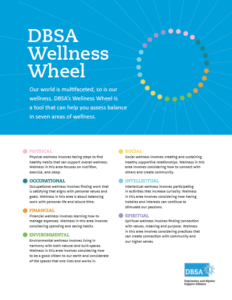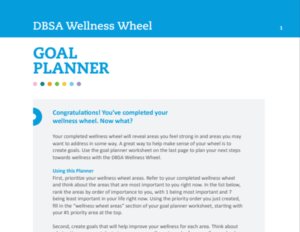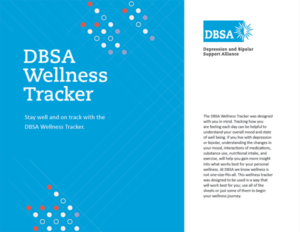The New Year can be an overwhelming time, especially if you like so many of us put a lot of things on the “I’ll get to it in January” list. Some things you may be thinking about as we start the new year are integrating structure and routines, adopting healthy habits, and finding the tools you need to support your well-being. Fortunately, DBSA has free resources that can help you create a wellness path that’s just right for you.
 The DBSA Wellness Wheel
The DBSA Wellness Wheel
The DBSA Wellness Wheel is a great tool to help you start exploring your wellness. By evaluating seven areas, you’ll be able to see your strengths and opportunities for growth in perspective. Once you complete your wheel, you’ll get a fuller picture of what wellness looks like for you. As we start the new year, it can be good to use a tool like Wellness Wheel so you can assess where your priorities lie. While advertising may want to pigeonhole us into working on nutrition and exercise, maybe you’d rather be exploring your intellectual wellness or financial goals. Whatever you decide to work on, know that taking the step to complete your wheel is a huge leap forward in working toward the life you envision.
 The DBSA Wellness Wheel Goal Planner
The DBSA Wellness Wheel Goal Planner
Once you’ve completed a Wellness Wheel workbook page, you’ll see your strengths and areas for growth. Then you may ask yourself, what’s next? If you are feeling ready to create some goals around one of the seven areas of wellness, we would like to suggest our Wellness Wheel Goal planner. Looking at your Wellness Wheel, which of the seven areas had opportunities for growth? Setting smaller goals that ladder up to larger ones can be helpful in managing expectations. And, goals can change and shift all the time, so be gentle and kind to yourself in the process.
 The DBSA Wellness Tracker
The DBSA Wellness Tracker
If you’re looking for a little more structure, you may enjoy using the DBSA Wellness Tracker. The Wellness Tracker is a great way to track mood, medication, symptoms, as well as other lifestyle measures that can help you understand patterns in your life. This tool can be especially useful if you are working with a mental health professional. While it can be difficult to remember how felt each day, tracking gives a greater sense of the ebb and flow of our mood and what may help or hurt our wellness goals.





